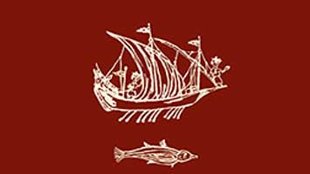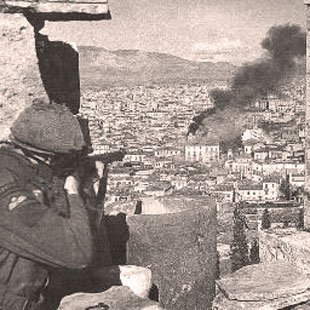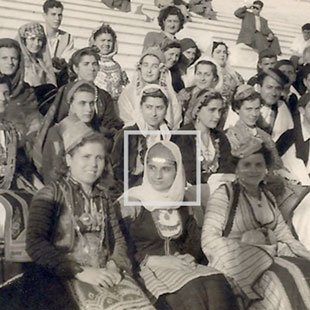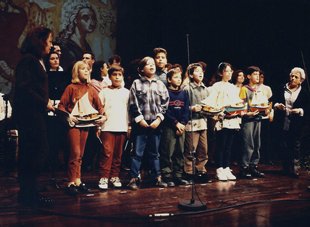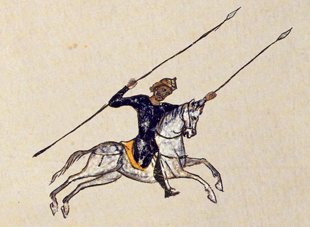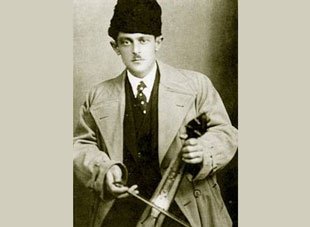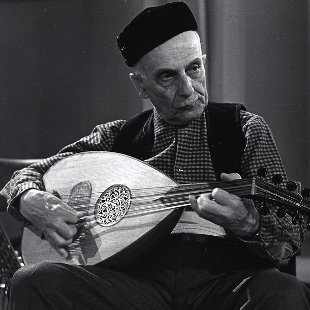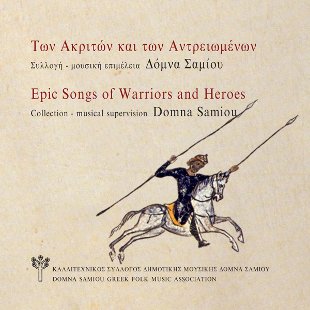You are at: Home page Her Work List of Songs Young Kostantinos
The Evil Mother-In-Law
Ο Κωσταντίνος ο μικρός
Listen
Lyrics
Young Kostantinos, young Konstantinos,
his mother had him young and betrothed him young
and he was young when he was called up to war.
He saddled his steed in the night, he shod him in the dark,
[he gave him silver horseshoes with golden studs
and a saddle inlaid with pearls.
Then he leapt astride him like the fine young lad he was,
looking for all the world like Saint George, like Saint Constantine.
In the time he took to say ‘Stay well’, he was forty miles away,
and in the time they took to say ‘Fare well’, he'd done forty more.
- Mother dear, be good to my beloved,
feed her milk in the morning, feed her milk at noon
and when the sun sets, make her bed so she can lie down and sleep.
But that wilful bitch, a Jewess's daughter,
sat her on a stool and cropped her beautiful blond hair,
cut off her flowing locks so like a man she'd look,
gave her a smock to wear and a shepherd's stick
and sent her to herd the sheep and goats.
Down at Saint Thodoros', near Saint Panteleimon chapel,
there was a fair to mark Saint Kostantinos' day.
The stalls were many and the visitors few,
twelve circles of dancers, eighteen wrestling rings.
And the wolf seized a child from inside the wrestling arena.
The poor mother run after him
but the boy was crazed and called out to his mother.
- Go back, mother, go back! Don't search to save me!
Remember when you mixed ash into the flour
then shrieked and shouted ‘Come get your pure flour’?
Remember when you killed the snake on the stone sill
and shrieked and shouted ‘Come get your sea fish’?
- Teacher, where's the boy, where's Kostantinos?
- It's been three days since I laid eyes on him, and three since I taught him,
and if I don't see him today, I'll lose him from my mind.]
Translated by Michael Eleftheriou
Original Lyrics
Ο Κωσταντίνος ο μικρός
Της κακής πεθεράς
Ο Κωσταντί- ο Κωσταντίνος ο μικρός,
ο Κωσταντίνος ο μικρός, ο Μικροκωσταντίνος,
μικρόν τον είχε η μάνα του, μικρόν τ’ αρραβωνιάζει,
μικρόν τον ήρθε μήνυμα στον πόλεμο να πάει.
Νύχτα σελώνει τ’ άλογο, νύχτα το καλιγώνει.
[Βάνει ασημένια πέταλα, μαλαματένιες λόθρες
κι απάνω στα σελώματα όλο μαργαριτάρι.
Πήδηξε, καβαλίκεψε σαν άξιο παλικάρι,
σαν Αϊ-Γιώργης φάνηκε, σαν Άγιος Κωσταντίνος.
Κι ώστε να πει έχετε γεια, σαράντα μίλια πάει
κι ώστε να πουν και στο καλό, άλλα σαράντα πέντε.
- Μάνε μου την καλίτσα μου, μάνε μου την καλή μου
γάλα να δώνεις το πουρνό, γάλα το μεσημέρι
και το ηλιοβασίλεμα να στρώνεις να κοιμάται.
Μα κείνη η σκύλα η άνομη, οβραίισσας θυγατέρα,
πα στο σκαμνί την έκατσε κι αντρίκια την κουρεύει,
της κόβει τα ξανθά μαλλιά, της κεφαλής στολίδι,
μια γκούγκλα την εφόρεσε τη δίνει και ντογιάκα
να πα φυλάει πρόβατα, να πα φυλάει γίδια.
Κάτω στον Άγιο Θόδωρο, στον Άγιο Παντελέημο,
πανεγυρίτσι εγίνοντου τ’ Άγιου του Κωσταντίνου.
Το πανεγύρι ήτον πολύ κι ο κόσμος ήτον λίγος,
δώδεκα δίπλες ο χορός, δεκαοχτώ παλαίστρες.
Κι ο λύκος άρπαξε παιδί ’πέ μέσα απ’ την παλαίστρα.
Και το παιδί ήταν λωλό, τη μάνα του τη λέει.
- Γύρισε μάνα μ’, γύρισε, γύρισε πάλι πίσω.
Θυμάσαι όντες ’νεκάτωνες τη στάχτη με τ’ αλεύρι
και τσίριζες και φώναζες πάρτε καθάριο αλεύρι;
Θυμάσαι όντες εσκότωνες το φίδι στην πεζούλα
και φώναζες και έλεγες πάρτε θαλάσσιο ψάρι;
- Δασκάλα πού ’ναι το παιδί, πού ’ναι ο Κωσταντίνος;
- Τρεις μέρες έχω να το ιδώ και τρεις να το διαβάσω
κι αν δεν το ιδώ και σήμερα απ’ το νου μου θα το χάσω.]
Information
- Region: Eastern Thrace & Roumelia
- Categories: Acritic Song
- Rhythm: 4 beats
- Duration: 03:16
Collaborators
- Gaida (bagpipe): Yannis Dobridis
- Thracian lyra: Dimitris Arvanitis
- Daouli (davul): Yiorgos Mavromatis
Albums
Notes
The main song accompanying the ritual fire-walking which takes place on Saints Constantine' and Helen's day, called the Saint's song, is a composite made up of verses from three well-known narrative songs selected and adapted to the needs and meaning of the rite from a vast musical repository: ‘The evil mother-in-law’, ‘The wolf avenger’ and ‘The murderous mother’. Most of the verses, which are sung and danced in an ecstatic state, are from the first of the three, randomly intermingled with a few verses from the other two. Since the fire-walkers know all three songs well, they will have no difficulty recalling their full meaning. All three songs revolve around the theme of the hero's catastrophic relationship with his mother. However, the sequence and content of the verses make little sense outside the given context and without an understanding of the forgotten archetypal myth which underlies the ritual. The symbolism here centres on the sacred, autonomous and transgressive female figure in a maternal-conjugal relationship, who alternatively births, loves and destroys her young consort, the annually-dying and resurrected fertility divinity.
The British neo-Hellenist, Roderick Beaton, argues that the song was adopted by the fire-walkers apparently because of its hero's name - even though there is nothing in the features and behaviour of either son or mother that mirrors those of the saints being worshipped. Beaton was the first - and, perhaps, the only - researcher to posit that there may be ‘some latent meaning or possibility of interpretation which would further explain its suitability for the ritual of the Anastenaria’1.
Personally, I believe that the features of the mythic sacred figures that underlie the figures being worshipped in the Christian icons and the heroes of the secular folk songs both shed light on various aspects of the therapeutic fire-walking ceremony and, vice-versa, render comprehensible the composition criteria, function and meaning of the otherwise incomprehensible song2. Miranda Terzopoulou (2017)
1R. Beaton, Folk poetry of modern Greece, Cambridge University Press, 1980, p. 21.
2M. Terzopoulou, Με τα τύμπανα και τα όργια της Μητέρας. Η γυναικεία λαϊκή λατρεία ως πολιτική μεταφορά σε ένα συγκρουσιακό περιβάλλον, in Chr. Vlachoutsikou (ed.), Όταν γυναίκες έχουν διαφορές, Athens 2003, pp. 320-360 (see http://epth.sfm.gr/articles/daoEn.pdf).
Recording information
Recorded live in Langada on 23rd May 2001, at the Thracian Society’s house during the fire-walking ritual by Miranda Tezopoulou.
Member Comments
Post a comment
See also

Song
Andrónikos and His Black Steed
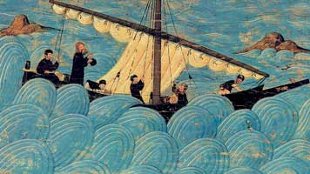
Song
At the Casement of the House

Song
Down at Aghia Marini
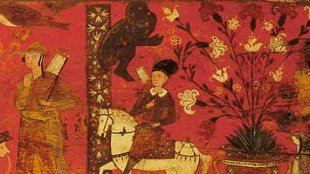
Song
I Passed by and Bade Good Day

Song
I Went Aboard a Boat
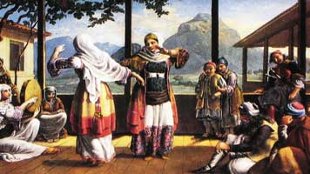
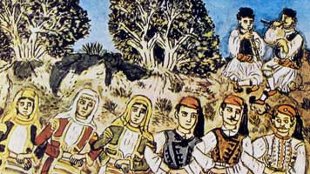
Song
Marandon
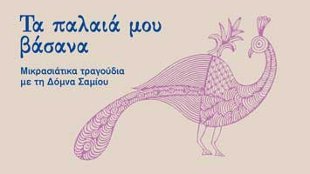

Song
No Father Had I
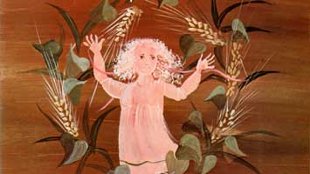

Song
The Dead Brother
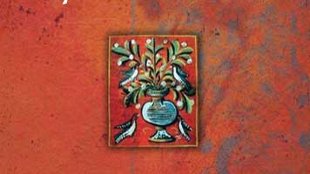
Song
Who Ever Saw a Tree of Green
